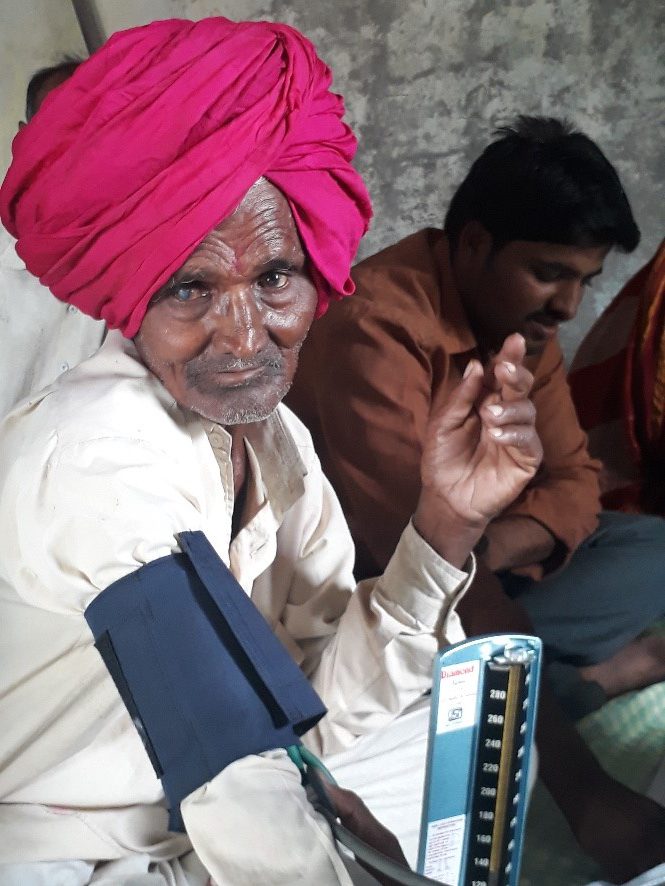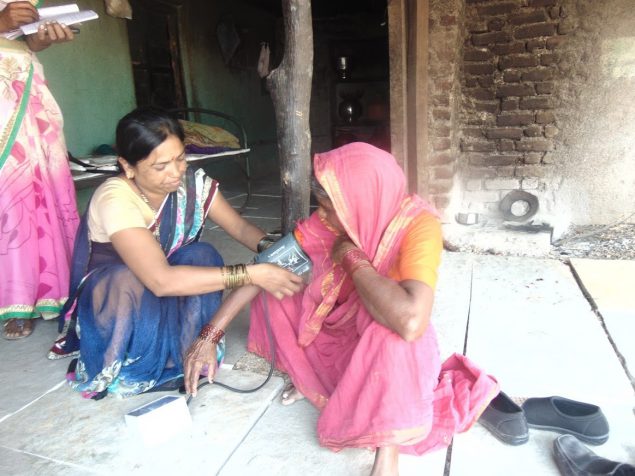Eradicating hypertension, the “silent killer,” in rural India
Last year CDC reported on how one doctor in India is working tirelessly to improve hypertension treatment and control in rural areas. This is an update of the original story, available at https://www.cdc.gov/globalhealth/stories/hypertension-in-rural-india.htm.

An elderly man with cataracts is screened for hypertension for the first time during May Measurement Month 2017. Research suggests a possible link between untreated hypertension and cataracts. Photo credit: Dr. Arun More
Dr. Arun More is on a long-term mission to prevent avoidable deaths from high blood pressure, or hypertension. In India, more than 29% of adults have high blood pressure, and cardiovascular disease is now the leading cause of death.[1] In rural India, levels of hypertension awareness and control are very low, especially among men and those younger than fifty years old.[2]
Because hypertension does not have visible symptoms, it is known as the “silent killer.” But Dr. More and his nonprofit organization, the Rural Health Progress Trust (RHPT), want to change that by raising awareness and improving management and control in the hardest-to-reach villages of southern India. RHPT does this by bringing international best practices in hypertension screening and treatment to remote areas where most residents have never heard of “blood pressure.”
India joins a global movement
One way to raise awareness of the dangers of hypertension is through May Measurement Month (MMM), a global awareness campaign run by the International Society of Hypertension. In 2017, over 100 countries screened over 1.2 million people, making MMM the world’s largest blood pressure screening program. The data collected will be used to expand the scientific evidence base and to influence effective public health program policies.
Dr. More leads India’s MMM activities in southern India. Over the course of 50 grueling days between April and June of 2017 his team of social health leaders and doctors screened over 60,000 people in rural villages for hypertension and provided education services and referrals. Not satisfied with this result, in 2018 Dr. More is aiming to screen 100,000 people.
Strategically increasing impact
How is he going to almost double the number of people screened in one year? He’s going to use a combination of creativity and networking. This year RHPT is training pharmacy students and schoolteachers to be volunteer screeners. He recently gave a lecture about the Global Hearts Initiative to general practitioners and is recruiting them to participate. He is even convincing his colleagues to sponsor their own village screening programs.
It also helps to target popular events that draw a large crowd. It is common for Indian weddings to have up to 1,000 guests, so this year Dr. More is reaching out to wedding halls and organizers to arrange hypertension screening at large weddings!
But screening for hypertension is only the beginning. Dr. More knows that quality data collection, awareness raising, and long-term treatment are more important than the raw number of people screened. People who have a high blood pressure reading will be referred to follow-up services at hypertension clinics, where they can get advice on how to manage their condition. Dr. More’s team will also carefully collect data and check the blood pressure of those who had high BP readings in 2017 to understand how effective the screening campaigns are at reducing hypertension prevalence.
Making change, one at a time

Social Health Leaders conduct door-to-door hypertension screenings during May Measurement Month 2017. Photo credit: Dr. Arun More
One of the most impressive things about MMM in India is that, by going door-to-door, screeners are able to reach people who have never had their blood pressure screened, and to provide services to those who would otherwise not be included in hypertension screening.
Despite his ambition and successes so far, Dr. More is very aware of the challenges he faces. Logistics and resources are always complicated, but even more so is the challenge of convincing people that hypertension, a disease with no visible symptoms, is a serious problem that requires action-oriented solutions. Undeterred, Dr. More continues to inspire doctors to join him. He hopes that by meticulously collecting data and showing impact over time, he can not only expand his team, but also begin to decrease the rising rates of hypertension in India. He also hopes to use his experiences and data to develop a more efficient method of managing hypertension in remote areas.
CDC is a partner, with the International Society of Hypertension, the World Health Organization and others, in the Global Hearts Initiative.
[1] https://www.ncbi.nlm.nih.gov/pubmed/27142605
[2] Arun M. Activity Report, January 2018.